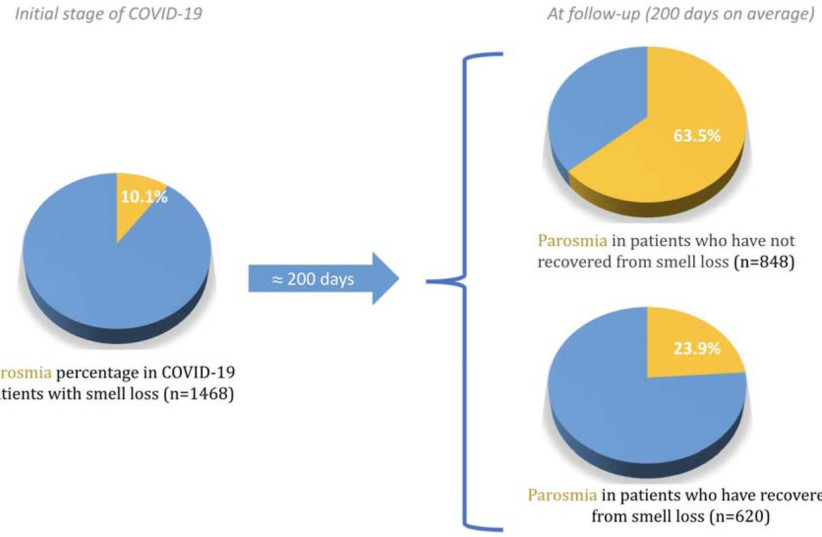The study, conducted through an international consortium for the study of the senses of taste and smell called the Global Consortium for Chemosensory Research, found that during illness, occurrences of parosmia—a condition in which certain odors are distinct and often unpleasant—and Phantosmia – a phenomenon of hallucinogenic smell that is not actually present – occurred in only 10% of patients who had lost their sense of smell. However, after recovery, the incidence increased significantly: 47% reported parosmia and 25% phantosmia.
Typical reports received for patients with parosmia are things like, “There are things that now smell different and unpleasant” or “like chemicals.” Reports of phantosmia include reactions such as “sometimes I smell fire that no one around me can smell”.
cnxps.cmd.push(function () { cnxps({ playerId: ’36af7c51-0caf-4741-9824-2c941fc6c17b’ }).render(‘4c4d856e0e6f4e3d808bbc1715e132f6’); });
if(window.location.pathname.indexOf(“656089”) != -1){document.getElementsByClassName(“divConnatix”)[0].style.display =”none”;}else if(window.location.pathname.indexOf(“/israel-news/”) != -1){ document.getElementsByClassName(“divConnatix”)[0].style.display = “none”; var script = document.createElement(‘script’); script.src=”https://player.anyclip.com/anyclip-widget/lre-widget/prod/v1/src/lre.js”; script.setAttribute(‘pubname’, ‘jpostcom’); script.setAttribute(‘widgetName’, ‘0011r00001lcD1i_12258’); document.getElementsByClassName(‘divAnyClip’)[0].appendChild(script);}else if(window.location.pathname.indexOf(“/health-and-wellness/”) != -1){ document.getElementsByClassName(“divConnatix”)[0].style.display = “none”; var script = document.createElement(‘script’); script.src=”https://player.anyclip.com/anyclip-widget/lre-widget/prod/v1/src/lre.js”; script.setAttribute(‘pubname’, ‘jpostcom’); script.setAttribute(‘widgetName’, ‘0011r00001lcD1i_12246’); document.getElementsByClassName(‘divAnyClip’)[0].appendChild(script);}
 Graphic image showing the presence of symptoms of ‘hallucinatory smell’ in patients who have recovered from COVID-19. (credit: credit)
Graphic image showing the presence of symptoms of ‘hallucinatory smell’ in patients who have recovered from COVID-19. (credit: credit)
“We still don’t know why and how this is happening,” said Professor Masha Niev of the Hebrew University’s Faculty of Agriculture, Food and Environment, who led the study on behalf of the school.
According to their estimates, if about one million Israelis have recovered from the disease and about half of them have lost their sense of smell, it is likely that tens of thousands will have a poor sense of smell and/or one of these will suffer from these events.
Worldwide, the estimate would be around seven million people.
This specific study involved about 1,400 people who were surveyed, immediately after contracting the virus and up to 11 months later. The researchers found that between two and 11 months of illness, 60% of women and 48% of men reported less than 80% of the ability to smell, compared to pre-illness.
The taste settles more quickly and the smell rarely persists when it is cured.
“From the outside, a lack of smell may not seem like such a big deal,” said Niv, “but it can be dangerous, like you can’t smell a gas leak. It also has a huge impact on mood, Like if you can’t smell pleasant things. Some people develop anxiety.”
In addition, many people suffer from weight loss because they cannot smell food, which reduces their appetite.
He said the most important outcome of this study would be how to best treat the phenomenon because “right now, there really isn’t a gold standard of treatment,” as the issue was much more uncommon before COVID-19.
The study followed people who became ill before being vaccinated. The NIV said it is possible that symptoms are less pronounced in people who become ill after vaccination, “but this is just an educated guess and not something that has been shown yet.”